Preventive Dentistry & Oral Cancer Screening
For people who have experienced past dental trauma, it takes a lot of courage to make a dental appointment. We understand many people experience dental anxiety and are nervous. In order to help you handle your dental fear our oral surgeon offers nitrous oxide or general anesthesia.
Preventive Dentistry
What is the Periodontal disease ?
Up to seventy percent of adults have suffered from periodontal disease in their life
Periodontal (meaning “around the tooth”) disease is an infection that destroys the gum tissue and bone that support the teeth. Periodontal disease is often called the “silent disease”, meaning symptoms may not appear until the disease is in its advanced stage making it the number one cause of tooth loss in adults.
- Signs and Symptoms of Periodontal Disease:
-
- Itchy feeling in gums and teeth
- Red and puffy gums
- Gums that bleed during and after brushing
- Pus between your gums and teeth
- Persistent bad breath
- Sticky saliva
- Sticky feeling on your teeth when you wake up in the morning
- Difficulty in chewing food due to loose teeth
What causes periodontal disease?

Periodontal disease is an infectious disease!!
There are many bacteria in your mouth. The less you brush your teeth the better the chance for bacteria to form into plaque. Plaque is a sticky film of food debris, bacteria, and saliva.
If plaque is not removed, it turns into calculus (tartar). When plaque and calculus are not removed, they begin to destroy the gums, bone, cementum, and periodontal ligament.
Not only is it the number one reason for tooth loss, research suggests that there may be a link between periodontal disease and other diseases such as, stroke, bacterial pneumonia, diabetes, cardiovascular disease, and increased risk during pregnancy. Researchers are determining if inflammation and bacteria associated with periodontal disease affects these systemic diseases and conditions. Smoking also increases the risk of periodontal disease.
How does gum disease progress?
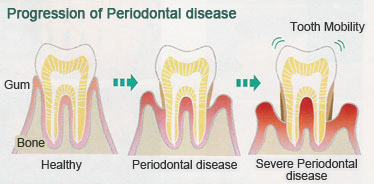
Four out of five people have periodontal disease and don’t know it! Most people are not aware of it because the disease is usually painless in the early stages.
After your doctor and hygienist remove the tartar you can keep plaque from forming by brushing and flossing. The gum will heal in early stages of periodontal disease.
However, if the periodontal symptoms are neglected and left untreated the disease will only progress causing the periodontal pockets to deepen and the surrounding gums and bone that hold the teeth in place to melt away.
Without any pain, periodontal disease often goes unnoticed even when the infection reaches the bone. This stage of periodontal disease is called advanced stage and is characterized by bone loss and loosening of teeth.
How is Periodontal Disease Treated?
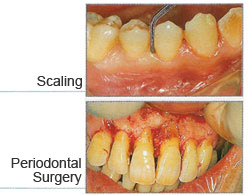
The importance of early detection and early treatment.
First, contact your dentist to schedule a comprehensive oral examination and start treatment.
Periodontal treatment methods depend upon the type and severity of the disease. These treatments include control plaque, scaling, scaling & root planning, and periodontal surgery.
*In certain situations tooth extraction may be necessary.
How does periodontal disease affect overall health?
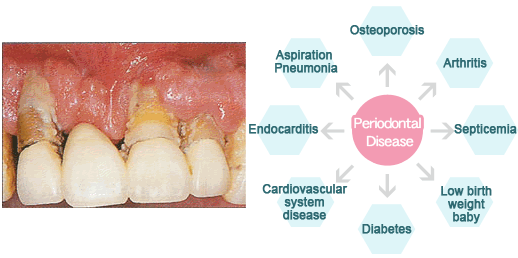
Neglecting periodontal disease can lead to more serious problems.
As the number of pathogenic bacteria increases in the mouth, they can gain entry into the bloodstream by either being absorbed through the mouth or directly into the intestines by swallowing causing various problems throughout the body.
Periodontal disease has been associated with Aspiration Pneumonia in the elderly, Septicemia, Endocarditis, Premature Birth, and Low Birth Weight Babies.
Maintenance after periodontal treatment
It is important to have regular check ups with your dentist.
It is important to change your life style in order to prevent periodontal disease from reoccurring.It only takes twenty four hours for plaque that is not removed from your teeth to turn into calculus (tartar)! Daily home cleaning helps control plaque and tartar formation, but those hard to reach areas will always need special attention.
Once your periodontal treatment has been completed, your dentist and dental hygienist will recommend that you have regular maintenance cleanings (periodontal cleanings), usually four times a year. At these cleaning appointments, the pocket depths will be carefully checked to ensure that they are healthy. Plaque and calculus that is difficult for you to remove on a daily basis will be removed from above and below the gum line.
Good oral hygiene practices and periodontal cleanings are essential in maintaining dental health and keeping periodontal disease under control!
What is Fluoride?
Fluoride is a natural mineral that is found in many foods that we eat and used as a preventive measure by strengthening the tooth enamel, making it more resistant to tooth decay.
- Fluoride is a essential nutrient that is found in many foods.
- Fluoride is a safe and effective when used properly.
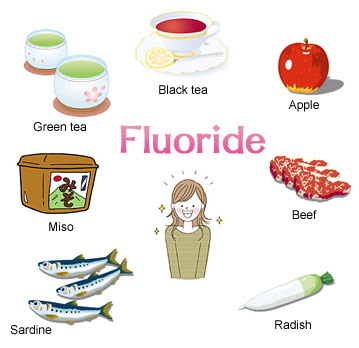
In the early stages of cavity formation, the bacteria in the plaque produces acid which attack the tooth enamel, resulting in loss of minerals and a decrease in enamel density.
During a dental check up, a dentist might tell you there are “watch areas.”
Cavity at the early phase of infection might be easily overlooked because there tends to be little or no symptoms. However, proper care at this early stage is critical.
Once a hole (cavity) is formed, it is necessary to have them treated by a dentist. With good oral hygiene a cavity in its early stages may be reversed.
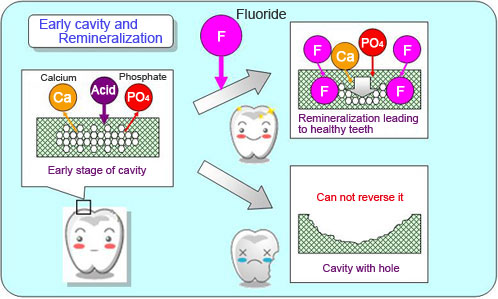
Functions of Fluoride
- Fluoride is used to promote remineralization and reduce the activity of cavity-causing bacteria.
- At the first stage of cavity development, demineralization begins with acid formation in dental plaque forming a white spot lesion on the outer surface of the enamel.
At this point, topical application of fluoride helps to promote remineralization and repair the demineralized areas of the teeth. Fluoride has antibacterial qualities which aide in reducing bacteria activity in the mouth. - Topical application of fluoride not only benefits children but adults as well.
- The process of demineralization and remineralization occurs every time we eat or drink foods.
When fluoride is absorbed by the tooth Hydroxyapatite, the main component of enamel, is stabilized by making it more resistant to the acids produced by the bacteria in the mouth.In adults, fluoride also helps in preventing cavities in exposed root surfaces. - Daily exposure to small amounts of fluoride will reduce the risk of tooth decay.
- In addition to in-office high concentration fluoride treatment, we offer at-home fluoride therapy for caries prevention including rinses, gels, and dentifrices.
Oral Cancer Screening
Although the oral and pharyngeal cancer represents only about 2% of all cancers in Japan, the incident rate is higher than that of leukemia. According to the latest report, 10,000 cases are diagnosed annually with oral and pharyngeal cancer, leading to more than 6,500 fatalities. These figures indicate that the incident rate increases exponentially as much as 3 times higher than that of 30 years ago.
Screening measures for stomach cancer, uterine cancer, breast cancer, lung cancer, and colorectal cancer have been already well spread throughout the nation and those in cancer screening measures group are known to have, when cancers are detected early, a better prognosis than those in non screening measures group.
However, oral cancer incident and fatality rate continues to increase in Japan and oral cancer screening measure is not well established. Unfortunately, public awareness and interest in oral cancer is still very law in Japan and many people think of oral cancer as a rare disease.
Not to mention that oral cancer is a life-threatening disease, it may also impair some vital oral functions such as eating, speaking, and breathing. Also there is a possibility of a change in facial features with a significantly diminished QOL (Quality of Life).
Therefore, it is crucial to establish and implement an oral cancer screening system so that people will be better informed about oral cancer and the importance of early detection and prevention.
References. Center for Cancer Control and Information Services
Kazuhiko Shibahara, Akira Katakura, Oral Cancer Screening, Quintessence Publishing Co.
| Basic Oral Cancer Screening | |
|---|---|
| (1) Taking Medical History (2) Panoramic X-ray (3) Oral Exam (4) Basic Screening Report |
5,650yen |
| Additional Services | |
| (5) Cytodiagnosis (6) Vital Staining (7) Laboratory Test Result Report(send by mail) |
4,200yen |
| ※When lesion (tumor, precancerous lesion, or other similar disease) is found in a patient’s mouth, these additional services will be provided and the report will be sent by mail later. | |
| Corporate Medical Facilities | |
| University of the Ryukyus Hospital Department of Oral Surgery | |
Self Examination Tips for Early Detection of Oral Cancer
Unlike stomach cancer, lung cancer and colon cancer, oral cancer can be detected directly by observing the inside of the mouth using a mirror or asking your family members to check your mouth.
The earlier a cancer is detected and treatment undertaken, the better the outcomes.
We encourage you to get screened regularly for the early detection and prevention of oral cancer.
- A long-lasting mouth ulcer in your mouth.
- A white patch that cannot be scraped away.
- Frequent inflammation of the mucous membrane of the mouth
- Lump on the gums and the mucous membrane
- A biting wound that won’t heal
- Frequently wounded mucous membrane with sharp-edge dentures and cavities
- Feeling of loose teeth
- Difficulty moving the tongue
- Numbness of the lip and tongue
- Difficulty opening the mouth
- A history of heavy smoking and/or habitual daily smoking
(※ my smoking index [number of cigarette/day × years of smoking history] is more than 1,000 ) - Excessive consumption of alcohol
Mouthpieces
Sports Mouth Guards
Custom made athletic mouth guards for better and safer training
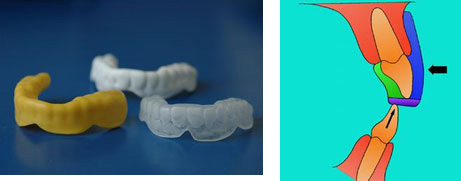
Injuries are common in all sporting activities. Facial and jaw injuries are especially common in fast-moving contact sports such as boxing, rugby, American football, and basketball. Furthermore, people may suffer more severe injuries such as a concussion with possible long-term physical and psychological effects in their daily lives. A mouth guard is a device made of flexible materials (soft plastic) that covers your upper teeth and functions to used to protect against mouth and jaw injuries in contact sports.
Please be aware!
A simple mouth guard can be purchased from any sporting goods store. However, it can fall out easily when opening the mouth and may cause a bad bite due to ill-fitting mouth guard which may lead to TMJ disorders. On the other hand, a well-designed custom-made mouth guard by your dentist provides the best comfort and protection. In order to obtain a precise fit, it is essential that impressions of your teeth be taken by your dentist.
Sleep Apnea Syndrome (SAS) Mouthpiece
We make a custom-made SAS mouthpiece in cooperation with specialist.
CPAP (Continuous Positive Airway Pressure ) is the most effective therapy for the moderate to severe sleep apnea. While sleeping, air is pushed from the flow generator through the mask. Then the air passes through the nose and into the throat, where the slight pressure keeps the upper airway open.
Using CPAP, you can sleep better and daytime sleepiness is likely to be eliminated.
If you are diagnosed with relatively mild sleep apnea, we recommend an anti snoring device.
We first take an impression your teeth, then create your custom-made anti-snoring mouthpiece.
Anti-snoring mouthpiece is designed to bring the lower jaw forward making the airway open so that obstructive sleep apnea and snoring can be corrected and deep sleep can be achieved.
BY APPOINTMENT ONLY

